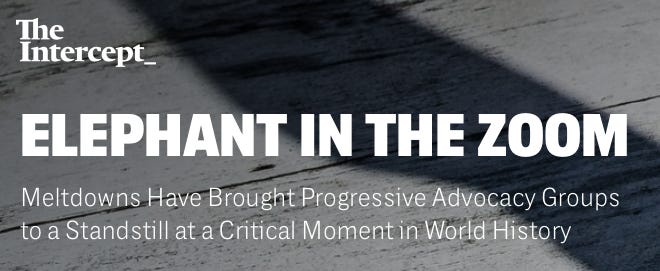General Ops Funding > Project By Project To Get Things Done
The structure of funding matters.
There is a lot of reaction to the Ryan Grim Intercept article I linked the other day about the struggles at progressive organizations. Matt Yglesias sees a pipeline problem, Sarah Haider offers some ideas to escape it. Lots of other thoughtful reaction.
Although education media has studiously managed to avoid covering this in education organizations, it's present in the ed sector as well. For instance, some education organizations embraced the trendy idea that deadlines reflect a culture of "whiteness" or white supremacy and then got to navigate what it means to run an organization where employees can resist deadline pressure as a DEI issue. People are forced out for wrong think at odds with orthodoxy, even when that wrong think aligns more generally with broadly held viewpoints.
I think an aspect of this issue that is not being discussed enough overall is funding. Or more specifically the structure of funding. Set aside that the average progressive funder is way way way to the political and cultural left of the average American (and the average Black American it should be noted). That's well documented and while it creates blind spots it arguably has upsides and downsides in terms of creative pressure and change.*
What probably matters more to this question of organizational coherence and effectiveness is structure of funding. It's also well documented that conservative funders tend to give more general operating or broadly thematic grants. Then organizations make decisions about what they want to focus on and what kind of expertise to cultivate. Progressive organizations, by contrast, get more project based support. So this money is tied to particular projects, initiatives, or people.
This is why you see both people and organizations constantly reinventing themselves as experts on the issue du jour in education. While on the conservative side you see the deflation expert or estate tax expert or the whatever expert who has been laboring in obscurity for years or decades suddenly wheeled out ready to go when that issue emerges on the policy agenda again. Just yesterday the Supreme Court delivered another church - state ruling involving schools that represents a sustained legal campaign for about a half century to advance that issue. That does not happen with just project based funding.**
One of these models, the progressive one, seems inherently less stable and more susceptible to staff freakouts, funder pressure, faddishness, and all the rest. Whether you adhere more to conservative or progressive politics, just as an objective matter of effective management the conservative funding approach seems more stable and also to give management more ability to set priorities, plan, and act without fear.
In other words, if you want leaders to lead you have to create the conditions so that they can do that. In this way the general operating funding model is at least closer to the Maverick Insurance idea, whereas leaders dependent on project based funding are going to be more constrained.
That's not progressive or conservative per se, it's just about organizational effectiveness.
*My own view is you want people pushing in a bunch of different ways, because ideas that are at one point considered fringe often become accepted over time - think reverse income tax or gay marriage. So the problem is not any particular direction, it's orthodoxy. But I helped found an organization predicated on the idea of viewpoint diversity as important to problem solving so your mileage may vary.
**A second issue here is the common claim that people are just on the take. It happens, but in general I think in education people get the causation here backwards.


